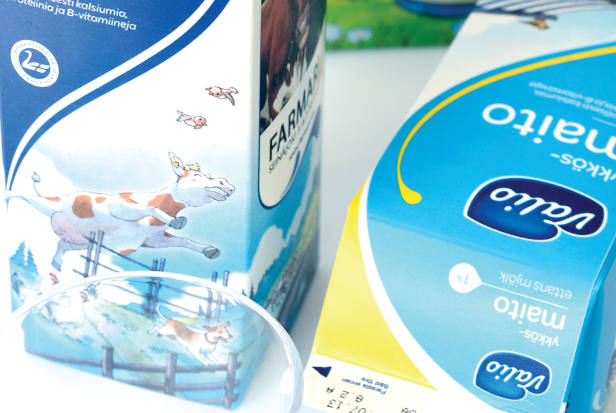Food packaging

Case - Published 4.7.2014
Over the years, the manufacture of pulp and paperboard has advanced to a point that the same amount of wood now provides over 50 percent more milk cartons compared to four decades ago. Today, a one-litre milk carton is 20 percent lighter than two decades ago while still providing the same level of protection.
Good packaging is vital to efficient food supply. The package protects the contents and their properties. Food loss and its environmental load would be many times higher if food products weren’t packaged at all.
The milk carton of Valio is an example of food packaging that all the Finnish people know. The milk carton blank included in the portfolio has been made at the Imatra factory of Tetra Pak. The paperboard comes from Stora Enso Imatra mills in reels weighing approximately one tonne.
The milk carton made of paperboard is primarily made from renewable natural resources. The paperboard comprises three layers. The surface and base layers are made from pulp. The middle layer is made from mechanical mass consisting of stiff wood fibres that make the packaging stiff and sturdy to handle. The material is made moisture-proof by adding a thin layer of polyethylene. The side seam of the carton is closed by heat sealing, which means that no glue is needed in the manufacturing process.
At Tetra Pak, the carton blank is printed with images and text, cut and seamed. The ready blanks are sent to Valio dairies in Riihimäki, Tampere, Jyväskylä and Oulu. At the dairy, the blanks are folded into the final 3D shape in packaging machines and filled with Finnish milk. The classic milk carton is now ready.
You can give an empty carton a new lease on life by recycling. The plastic cap of the carton is made from polyethylene just like the moisture-proof layer of the paperboard,and can thus be recycled with the carton. The cartons are collected from recovery points and taken to a sorting facility, where they are baled and transported to be used as raw materials by manufacturing industries. In the recycling process, plastic is separated from fibre by washing, and the fibre is used to make new products such as cardboard boxes, core stock, napkins or notepads. The plastic can be burned for energy .
An increasing number of businesses and consumers favour packaging made from renewable materials. There are also new materials such as microcellulose, which perhaps will make it possible to produce a milk carton completely from wood fibre.
Readymade children’s salads by Härmän Snackpoint are now served in new, cheerful trays. After the meal, the cleaned tray can be recycled.
Härmän Snackpoint’s salad tray is a children’s salad dish served in the DeLight packaging, manufactured by Lahti-based Delight Packaging Oy. Launched in 2009, this award-winning packaging solution combines the environmentally friendly cardboard package and the outstanding protection properties of the plastic. The package is fully recyclable.
Consumers are asking for healthier ready meals in eco-friendly and safe food packages. The primary material of the tray is a renewable wood fibre, and the tray can be used as a replacement for non-renewable materials such as plastic and aluminium.
The tray is manufactured by using a new invention – the strengthened rim ensures rigidity as the cardboard offers formability possibilities for the package. DeLight packages are manufactured by using injection-moulding technology which allows the package to be made in variety of shapes and sizes. The same technology can be used to make microwave oven and conventional oven safe trays for warm-up or heat prepared meals, as well as packaging solutions that provide a high degree protection and ensure a long shelf life for products.
DeLight offers an innovative and attractive new solution for packaging food, cosmetics and other consumer goods. In addition to the innovative design, the lightweight yet durable packages feature high-quality printing, which makes them stand out. Product and brand information can be printed directly onto the surface of the tray, and separate labels aren’t necessarily needed.
The Delight packaging business was purchased by Suomen Kerta Oy from Stora Enso in 2013. Through this acquisition, Suomen Kerta Oy, which already manufactures disposable kitchenware in Imatra, table decorations in Kotka and candles in Riihimäki, is strengthening its foothold in the fibre-based packaging markets.
Text and photos are from the info cards in the presentation briefcase on the Finnish forest sector. The idea of a briefcase with various kinds of samples to present this diverse sector came from the young people themselves. The briefcase has been handed out at visits to upper secondary schools.
More information on the briefcase and visits: vilma.issakainen(@)smy.fi and anne.kettunen(@)forestindustries.fi.

